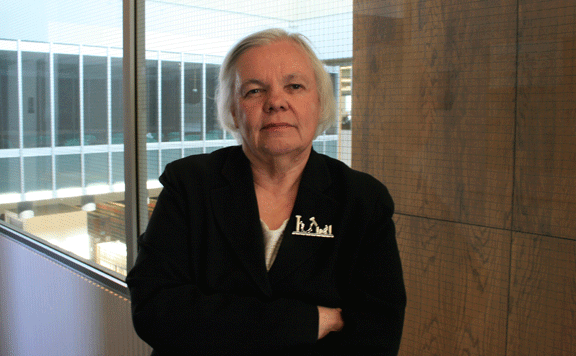Cutting through university red tape
One of the overarching goals of the University of Saskatchewan’s third integrated plan is to improve the efficiency of program and service delivery, and to that end, Beth Bilson is heading up an effort to cut through the red tape.
By Colleen MacPherson Even before the new Red Tape Commission began its work, the catchy title had people stopping Bilson in the halls "to press suggestions on me" about where she might clear up the time-consuming bureaucracy that hinders teachers, researchers and students. The mandate of the five-person commission is "to remove barriers for people at the sharp end of the system," said the law professor, to streamline processes and procedures "that take too much time, are unclear or require consultation with a lot of people before you know what to do."
Even before the new Red Tape Commission began its work, the catchy title had people stopping Bilson in the halls "to press suggestions on me" about where she might clear up the time-consuming bureaucracy that hinders teachers, researchers and students. The mandate of the five-person commission is "to remove barriers for people at the sharp end of the system," said the law professor, to streamline processes and procedures "that take too much time, are unclear or require consultation with a lot of people before you know what to do."
One step the commission is taking is a survey of "the people in charge of various systems like, for example, research services or student services, who are in a good position to point us in the direction of things we might want to look at." The goal is to identify red tape that is irritating or burdensome, particularly in the areas of teaching and research. The commission will then do a bit of investigating and make suggestions for reform, or point out who should be responsible for refining processes.
At the same time, the committee will be soliciting suggestions from all students, staff and faculty about their frustrations with a particular piece of red tape. A website for this purpose is in the works.
While nobody is overly fond of red tape, Bilson cautioned the commission's role is not to eliminate all bureaucracy, some of which is necessary for the institution to operate.
"When you're in an academic community, you often find academics thinking they shouldn't have to do anything that resembles filling in forms but the questions is, what is overly onerous? If there are 92 people who identify the same form as being an issue but there's a perfectly rational explanation for why that form is necessary, we may just have to say sorry, this form serves a necessary purpose. We can't just say do away with this form, but we can make recommendations on who should look at it."
This kind of examination is worthwhile in any system, Bilson continued. "In any big institution, a lot of these things arose because somebody decided something needed to be kept track of … and that's the kind of thing we're looking for, things for which there isn't sufficient rationale or that aren't working very well."
Joining Bilson on the commission are Dale Ward and Marek Majewski from the Department of Chemistry, John Rigby from the Edwards School of Business and Jim Handy from the Department of History.
Bilson said the commission expects to submit a report to the university provost by the spring of 2014 about streamlining bureaucracy at the U of S. Success, she said, would be "that we can either identify things and succeed in persuading someone to change them or provide rationale for why that red tape has to stay in place."

